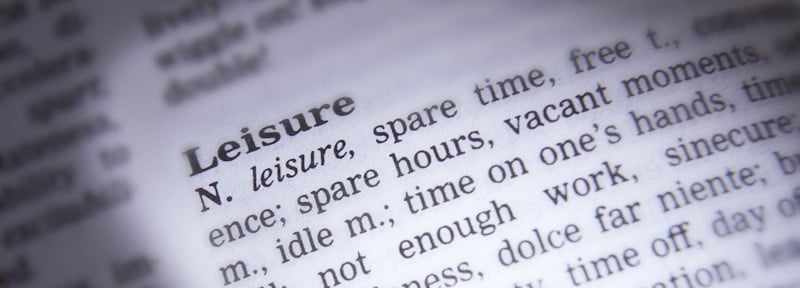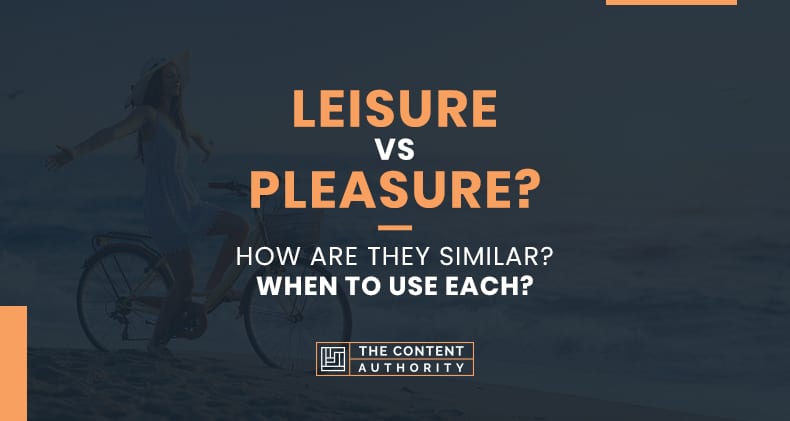Exercising is something most people do during their leisure or free time. Others exercise because it gives them pleasure. And several people derive “pleasure” from watching TV or browsing the Internet during their “leisure” hours.
“Leisure” means “doing nothing at all” or “resorting to fun, non-strenuous activities when free”. “Pleasure” is “any activity or thing that invokes happiness or a sense of content”. One can be at “leisure” or do nothing and still feel good. The feeling of gratification will, however, be missing.
“Leisure” and “pleasure” overlap each other in a few ways but are significantly different words altogether. Read on to learn more about the two terms, besides a host of additional information related to them, so you have a clear understanding of what the two truly denote.

What is “Leisure”?
The word “leisure” means “free time”. It also means “doing things unhurriedly”. Some of the words/phrases related to or synonymous with “leisure” include:
- Recreation
- Relaxation
- Spare time
- Idle hours
- Time off
- Vacant hour
Though the term “leisure” is primarily identified with “doing nothing at all”, it could also mean doing things that are enjoyable – for instance, any kind of recreational activity.
The objective behind “being at leisure” is escaping responsibilities by doing nothing at all or doing things that are not related to work or what you do for a living. It’s disconnecting from everything, keeping both your professional and personal worries at bay momentarily. The activity is invariably more desirable than “work” as there’s no real effort involved.
A “leisure activity” is usually not physically or mentally taxing, but it is also not gratifying. It can be enjoyable, but it doesn’t afford a sense of “accomplishment”. For example, watching TV is not real work, and it also does not evoke the perception of having completed a “task”. But it’s certainly enjoyable.
There are exceptions to this rule, however. You can derive a sense of “attainment” out of leisure time, but that’s contingent on your interests or hobbies. For example, if you like to read books during your free time, the activity can be both enjoyable and give you the feeling of having done something useful.
How Long Can You Be at “Leisure”?
There is no set rule or time limits for being “leisurely”. Some people may spend a few minutes or hours doing nothing, and there are others who could spend the entire day lying on their bed or couch. The actual time spent leisurely could depend on how physically and/or mentally stressed you feel.
Also, the more time you spend at leisure doesn’t directly translate as more enjoyment and gratification. It depends on the activities you indulge in. You may enjoy watching TV or listening to music during the initial hour or two. But if the activity extends, it may get monotonous and not be fun anymore. Similar is the case with reading a book, cooking or doing anything considered as “productive”.
In short, the length at which you can be at leisure and enjoy the same depends on how long it takes you to breach your “pleasure” threshold. If you play casual video games throughout your free time, you may not be able to pull that off for very long – maybe an hour or two.
Benefits of Being “Leisurely”
There are multiple benefits attached to doing nothing at all or doing something fun in your free time. They include:
- Reduced stress and feelings of depression as your mind is relatively free or cut off from quotidian life.
- Physical leisure activities, such as playing an outdoor sport or walking on the beach, can improve your mental and physical health.
- A clear and calm mind will make you more efficient and productive when you get back to work.
Overall, taking time out from the humdrum now and again helps you feel a lot more connected to yourself, both emotionally and physically.
Using “Leisure” in Texts
The word “leisure” is a noun, but it can also be used as an adjective in texts. “Leisure hours”, “leisure class”, “a leisure jacket”, etc., are some phrases that use the term as an adjective. The following are sentences using “leisure” as a noun:
- Polo is primarily a leisure sport.
- We earlier had a debate over the usage of leisure facilities.
Leisure is also used in idioms, such as “at leisure”, which means “with unhinged or free time” or “slowly”. For example:
- Due to his start-up failing, he is currently at leisure.
- Read the book at leisure.
The term “leisure” is invariably used in texts when referring to activities such as:
- Attending auctions
- Bicycling
- Bird watching
- Fishing
- Hiking
- Driving
There, however, is no hard and fast rule associated with using “leisure” in writings. If you feel the word fits in well in a given context, go ahead and use the term.

What is “Pleasure”?
“Pleasure” is “the feeling or state of being happy or pleased”. It also denotes “a state of gratification”.
People derive pleasure by indulging in activities they like. The pastime could be anything as simple as eating a bucket of their favorite fried chicken or something as far-fetched as mountain-climbing. The words “delight”, “enjoyment”, “joy”, etc., are comparable to the term “pleasure”.
“Delight” denotes “heightened pleasure”. When a person is “delighted”, they are usually expressive. However, an individual who is “pleased” is more likely to keep those feelings to themselves. The term “enjoyment” denotes “pleasurable satisfaction”. The word coincides with “pleasure” more than most other synonyms of “pleasure”. The feeling derived from finding shade on a sunny day can be either described as “pleasurable” or “enjoyable”.
“Joy”, on the other hand, is a feeling that’s beyond the state of delight. When a person is feeling joyful, they express it spontaneously or radiate with happiness. In other words, upon receiving a promotion at work, people are not “pleased” but feel “joyous”.
Using the Word “Pleasure” in Texts
Generally, activities that most people resort to during their “leisure” hours offer “pleasure”. However, there are specific activities that you could be sure of finding pleasure in. Those activities/things include:
- Watching your favorite sports team playing in the finale
- Taking a sip of coffee first thing in the morning (if you’re a coffee person)
- Spending time with a good friend after a break
- Traveling to your favorite destination
- Being super-productive at work or something you’re passionate about
- Hugging a kid
- Going on a drive with a loved one
- Having a wonderful meal
If you use the word “pleasure” to denote or describe an activity, make sure the endeavor or interest is “pleasurable” enough to qualify for the term. As mentioned above, “exercise” may afford some people pleasure, but it may be a chore or even a stress-inducing task for quite a few.
Comparing “Leisure” and “Pleasure”
As mentioned before, the words “leisure” and “pleasure” overlap each other quite a bit. However, there are a few differences between the two.
For starters, “leisure” denotes “not doing anything” or “being free”. The word “pleasure” has no such connotations. In other words, “pleasure” doesn’t imply “taking time off”. People can derive “pleasure” from their work, but they cannot or usually do not work during “leisure” time.
Also, as mentioned above, “pleasure” goes hand in hand with “gratification”. The same cannot be said of “leisure”. “Leisure” activities offer “frivolous amusement” or do not offer any value or have any serious purpose.
As far as similarities go, a “leisure” activity can make you feel good or not feel any strain. If “leisure” time is used productively or to serve one’s interests, the period can be stimulating and also “pleasurable”.
Example Sentences with the Term “Leisure”
The following is a list of sentences that incorporate the term “leisure”:
- She pursued her interests during her leisure in the evenings.
- Leisure or vacation-related travel is usually considered non-essential.
- For the voter turnout to be substantial, it’s imperative the elections are conducted when the citizens are at leisure.
- The ban on leisure activities carried out indoors in public places is yet to be lifted.
- That guy, who is currently at leisure, is highly skilled and has loads of experience behind him.
- I do not have much leisure time at my disposal.
- Most people in the city spend most of their leisure hours shopping.
- He is looking forward to a leisure-filled life after he retires.
- She wrote that book during her leisure time.
- Is this dress casual enough to be worn during leisure?
- Unfortunately, most people spend the majority of their leisure hours on their phones or browsing the Internet.
- Only a wise person can use their leisure time, “productively”.
Example Sentences with the Word “Pleasure”
Here are sentences using the word “pleasure” and some of its inflections:
- Hosting the Queen was our pleasure!
- I was pleased to meet him during a video call.
- I am sure you were pleased to learn that she felt attracted to you.
- Painting offers me pleasure.
- Tim’s parents were immensely pleased to see their son graduate from law school.
- Impulsive shopping offers me a feeling of high and pleasure that’s hard to explain.
- What is your guilty pleasure?
- His only pleasure activity was listening to music.
- People who live in cities and towns do not know how pleasurable country life can be.
- The pleasure was ours!
- Dinner with you is always a pleasure.
Conclusion

Unlike homonyms, “pleasure” and “leisure” have a reasonably distinct spelling and sound to them when pronounced. But because their meanings are similar or overlap each other, confusions may arise. This in-depth comparison hopefully helped you demarcate the two a lot more clearly and convincingly.
Shawn Manaher is the founder and CEO of The Content Authority. He’s one part content manager, one part writing ninja organizer, and two parts leader of top content creators. You don’t even want to know what he calls pancakes.

